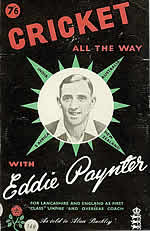Cricket All The Way
Archie Mac |Published: 1962
Pages: 115
Author: Paynter, Edward
Publisher: A. Richardson (Leeds) Ltd.
Rating: 2.5 stars

This is the autobiography of Eddie Paynter (as told to Alan Buckley), most famously remembered in cricket history as the man who left his ‘sick bed’ in a Brisbane hospital to win a Test match for England during the infamous Bodyline series.
From the small Lancashire town of Oswaldtwistle, the young Eddie Paynter started work in the mills at the tender of 12, this early occupation almost ended any chances of future employment as a professional cricketer, for at the age of 13 he lost the tops of both the first and second fingers of his right hand in an accident at the mill.
Four years later the Paynter household were to experience more grief when Eddie’s elder and only bother was killed during the Great War.
Paynter was a late bloomer and did not secure a place with the Lancashire county team until the age of 24, this was understandable when considering the strength of LCCC in this period with players such as Ted McDonald, Cecil Parkin and George Duckworth.
His account of the Bodyline tour is the highlight of the book, giving insight to is sojourn during the fourth Test at Brisbane. His account of events is quoted almost verbatim in the definitive book on the subject Bodyline Autopsy written by David Frith.
It was during this match that Eddie spoke to his wife May in Manchester by use of the ‘modern miracle’ the international telephone.
During the Bodyline series Eddie Paynter was also assaulted while walking to the Adelaide Oval. A group of men deliberately charging into the back of him, and leaving him sprawled on the pavement, the offenders running off before any action could be taken.
The book is written in the typical style of the period with most of the writings avoiding too much controversy or criticism. However Payter was still scarred by his treatment of the national selectors, when they left him out of the tour to Australia in 1936-37 especially when one of the selectors told him ‘pack your bags, Eddie, you’ll be going to Australia’. Paynter finds it hard to understand how he was overlooked for the amateur R.E.S. Wyatt
From this distance it is hard to understand the selectors reasoning as during the 1936 season Paynter averaged 45 from 2016 runs, and Wyatt 32 from 1261 runs.
Finances are a recurring theme throughout the book, and Paynter was desperately unlucky too miss out on a benefit because of the Second World War, these benefits could often set a Player up for life. Instead Eddie was given just 1000 pounds by the Lancashire committee, a LCC Player would expect to make around 10,000 pounds from a benefit during this period (1940s).
Eddie Paynter spent his years after playing professional cricket as an umpire, coach and republican but unfortunately he spent his final years according to David Frith “without wealth, stacking wool in a Yorkshire mill”.







Leave a comment